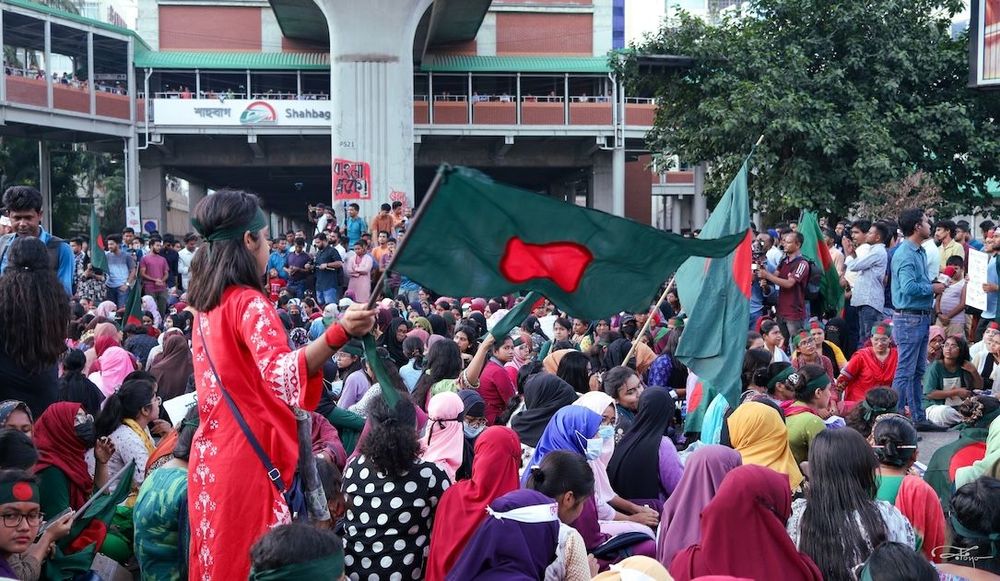Bangladesh is сoming back online after five days of near-total internet blackout
Internet service is partially restored in Bangladesh as of Wednesday after five days of shutdown amid deadly student protests against a quota system for government jobs.
According to data from several internet monitoring services, fixed-line connectivity in Bangladesh has been partially restored late on Tuesday, but traffic and the range of IP addresses that are currently active are still significantly lower than they were before the shutdown.
Social media and mobile data restrictions in the country continued as of Tuesday, limiting the public's right to communicate and stay informed, according to the report by NetBlocks.
The local government is restoring internet services gradually — first providing it to state hospitals, water supply and sewerage authorities, electricity supply companies, and banks, local media reported.
Nearly 8 hours after recovery began, #Internet connectivity in #Bangladesh remains available, though both traffic and announced IP address space remain well below pre-shutdown levels.
— Cloudflare Radar (@CloudflareRadar) July 23, 2024
The 5 day shutdown was in response to student protests.
See more at https://t.co/7NSUWTk1cn pic.twitter.com/EFOtwBLfU0
The country’s communication authorities are to decide on Wednesday how and when to restore mobile internet.
Bangladeshi students have been demonstrating for weeks against a quota system for government jobs, which they say favors allies of the ruling party. The clashes between protesters and the police killed almost 150 people.
This week, a nationwide curfew in Bangladesh was eased, businesses partially reopened, and public transport began running in some places, according to local media reports.
Bangladesh's government shut down the country’s communication channels, including mobile and broadband internet services, on July 18, cutting off the country’s population from the rest of the world.
The government has also enforced a de facto blackout of all national media outlets, including the press, broadcasting, and radio, resulting in the Bangladeshi people only receiving a partial narrative of the events on the ground, according to the report by Tech Global Institute nonprofit.
“Since the blackout, expatriate Bangladeshis trying to reach their families and loved ones are finding outdated information online, including out-of-context videos, false information, and disinformation shared by malicious actors, which widens existing trust deficits among the public,” researchers said.
The latest shutdown has cost the Bangladesh economy over $25,626,000 according to Internet Society's NetLoss calculator.
Last week, over 40 civil society organizations, including digital rights nonprofit Access Now, demanded Bangladeshi authorities put an end to their “rights-harming and unconstitutional internet disruptions.”
“Internet shutdowns are a disproportionate measure and ineffective at quelling violence, and are likely to have the opposite effect, as they reduce people’s agency to counteract misinformation," Access Now said.
Since 2018, access to the internet has been throttled, and social media and messaging applications blocked several times in Bangladesh, without either the government or telecommunication operators offering any explanation, researchers said.
For instance, in 2018, mobile internet was slowed down nationally during the protest over road safety. Between 2019 and 2023, multiple instances of internet disruptions have also been recorded in Bangladesh during protests and opposition rallies.
“Disrupting access to the internet and mobile applications is costly and harmful to communities and businesses, and violates fundamental freedoms of expression and access to information under Article 39(2) of the Constitution of Bangladesh,” Access Now said, urging local authorities to respect people’s constitutional rights and the country’s international commitments.
Daryna Antoniuk
is a reporter for Recorded Future News based in Ukraine. She writes about cybersecurity startups, cyberattacks in Eastern Europe and the state of the cyberwar between Ukraine and Russia. She previously was a tech reporter for Forbes Ukraine. Her work has also been published at Sifted, The Kyiv Independent and The Kyiv Post.



